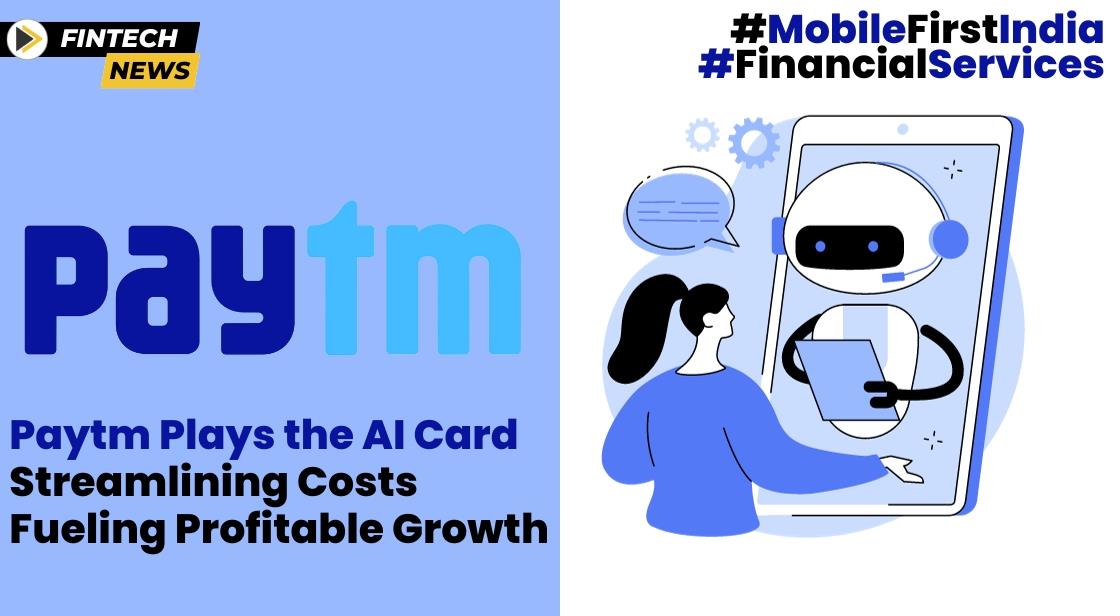Paytm's Strategic AI Implementation Spurs Profits: A Game-Changing Move in Fintech

News Synopsis
The fintech powerhouse, Paytm, is strategically harnessing the potential of artificial intelligence (AI) to transform the landscape of payments and financial services. In an exclusive interview, Paytm's Founder and CEO, Vijay Shekhar Sharma, highlighted the pivotal role of AI in the company's revolutionary approach.
Paytm's AI-Driven Revolution
Embracing an AI-centric approach, Paytm has streamlined operations and enhanced financial services, resulting in a reduction in workforce without compromising on innovation. A spokesperson from Paytm underscored their commitment to driving efficiency through AI-powered automation, leading to significant cost savings.
AI-Powered Efficiency and Innovation
The fintech giant is steadfast in its pursuit of leveraging AI to drive efficiency across growth strategies while curbing operational costs. Paytm has strategically planned a workforce reduction of 10%, simultaneously driving innovation in the Indian market's payment and financial sectors.
Competitive Edge Through AI Adoption
Capitalizing on its robust mobile-first foundation and early AI integration, Paytm envisions gaining a substantial competitive advantage in the dynamic fintech landscape.
Employee Reskilling for AI-Centric Roles
Recognizing the evolving landscape, Paytm underscores the importance of upskilling and reskilling its workforce to adapt to AI-enabled roles. Sharma emphasized the necessity of empowering employees for AI-driven responsibilities within the company.
AI-Driven Cost Savings and Profitability
Paytm's Founder and CEO, Vijay Shekhar Sharma highlighted how AI initiatives have surpassed initial expectations, enabling Paytm to achieve targeted cost savings of 10-15% on employee expenditures. The company's prudent AI utilization has significantly contributed to its financial robustness.
Strategic Financial Objectives
With a sharp focus on enhancing profitability metrics, Paytm aims to achieve EBITDA-level profitability sooner. Remarkably, the company has consistently generated free cash flows in the last two quarters, a trend Sharma expects to maintain in the future.
Some relevant and latest facts related to news about Paytm's AI move:
1. Latest Financial Performance: Update the information about Paytm's current financials. As of October 27, 2023, Paytm reported its first-ever quarterly profit, with a net income of INR 122 crore ($15 million). This further strengthens the company's optimism about reaching EBITDA-level profitability sooner.
2. Workforce Reduction Nuances: While mentioning the planned 10% workforce reduction, clarify that Paytm also intends to redeploy certain employees within the company to AI-enabled roles. This highlights their commitment to reskilling and ensuring a smooth transition for affected employees.
3. Specific AI Applications: Provide concrete examples of how Paytm is utilizing AI, beyond just automation. Mention innovative applications like AI-powered credit scoring, personalized wealth management recommendations, and chatbots for customer service. This showcases the tangible impact of AI on their product and service offerings.
4. Industry Context: Briefly mention the broader trend of fintech companies globally turning to AI to automate tasks, improve efficiency, and personalize customer experiences. This positions Paytm's move as part of a larger strategic shift within the industry.
5. Competition and Differentiation: Briefly touch upon Paytm's key competitors in the Indian fintech space, like PhonePe and Mobikwik. Mention how Paytm's early adoption of AI and mobile-first focus might provide them with a differentiating advantage in the long run.
You May Like









